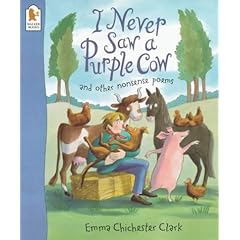
Jonah and I just finished reading a very fun book that I picked up at the library.
I Never Saw a Purple Cow (and other nonsense rhymes)
by Emma Chichester Clark
This book is so much fun. It's full of limericks and silly poems, including some by Louis Carroll and Edward Lear. We laughed until we cried while reading this book.
Now, I can see the humor in the actual jokes in something like this:
Little Jack Horner
Sat in a Corner
Eating his curds and whey;
There came a big spider,
Who sat down beside her,
And the dish ran away with the spoon.
But to Jonah, it just sounds hilarious. A big spider and a dish running away with a spoon? It's so preposterous to his newly budding sense of reason and order that it's totally hysterical to a 4 year old. Other bits of nonsense make more, uh, sense to him and he can actually see why they're so funny:
The elephant is a graceful bird;
It flits from twig to twig.
It builds its nest in a rhubarb tree
And whistles like a pig.
Jonah knows pretty well that a elephant is not a bird, nor does a pig whistle, and little kids love everything unreasonable.
So why read nonsense? Why not read something a little more, er... edifying? Aside from the fact that it's good clean fun for a fun-loving 4 year old, there are other good reasons to read nonsense. You see, things like this sneak education in through the back door.
Nonsense is not educational, you say? I beg to differ. Everyone can love learning when learning is fun! And we had so much fun reading this delightful book, that we gained exposure to all kinds of rhythms and rhymes without even knowing it! Sometimes we would read a poem, and then go back and find all the rhyming words. The book engaged his attention much better than other children's poetry books that we've read. Robert Louis Stevenson, for example, is fantastic, but a little harder to follow for the beginning poetry reader/listener. Oh, we'll keep reading those, for sure, so that Jonah can hopefully develop an appreciation for it through exposure. My point is that there is a place for everything, and even nonsense poetry has it's place.
This kind of reading also helps expand the way Jonah thinks about words.
I raised a great hullabaloo
When I found a large mouse in my stew,
Said the waiter, "Don't shout
And wave it about,
Or the rest will be wanting one, too!"
In poetry, a different syntax and word order often has to be used in order to achieve the intended rhyme and rhythm. (Said the waiter, "Don't shout...") I think it's good for developing language skills to give the brain an opportunity to grasp a thought expressed differently than expected.
Does Jonah understand everything that we read? Certainly not. I honestly have no idea what he actually gets out of our continual reading (seriously, how much of the actual content is he actually absorbing when Nathan reads aloud from his theology books --because Jonah asks-- like Textual Criticism?). But he loves being read to, usually seems to understand at least the basics of the stories, and at the very least, he's learning to listen. I have hopes that we're also laying a foundation for his own self-education when he learns to read. Right now, he wants to know everything about everything, and I can't wait until he can go find those answers for himself!
Of course, it's easy to have fun learning at this point while Jonah is little and just discovering so many fascinating things. At this point, he can learn rhyme without having to think about iambic pentameter and conversant A's and B's. But who knows what he'll find interesting later? People who really love poetry can truly enjoy the technical metering, too... Can we preserve the love of learning long enough that he will happily take his interests further? One can only hope and work creatively toward that end...





well said my dear.. well said. And as long as you guard against hate of learning, you will have that end
ReplyDelete